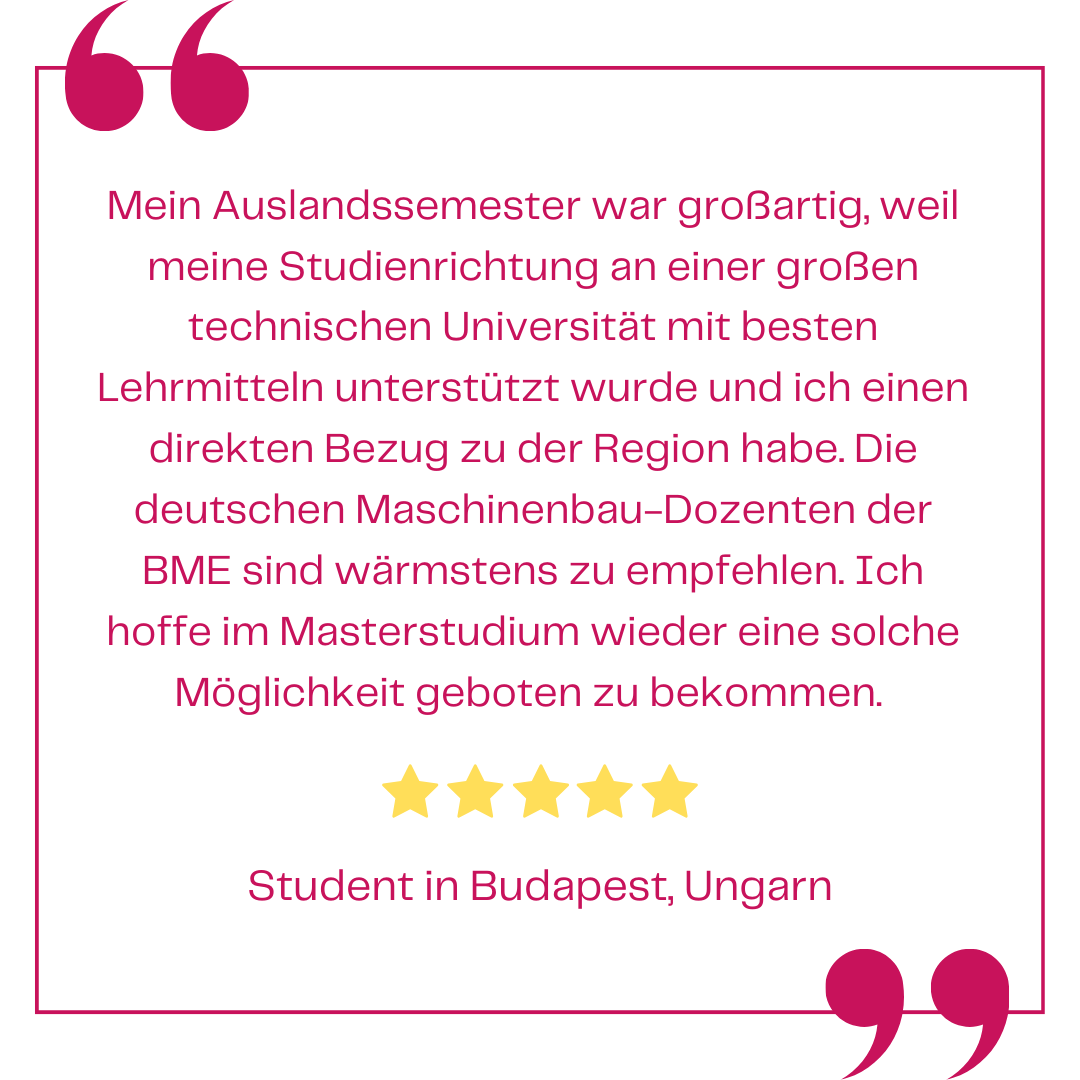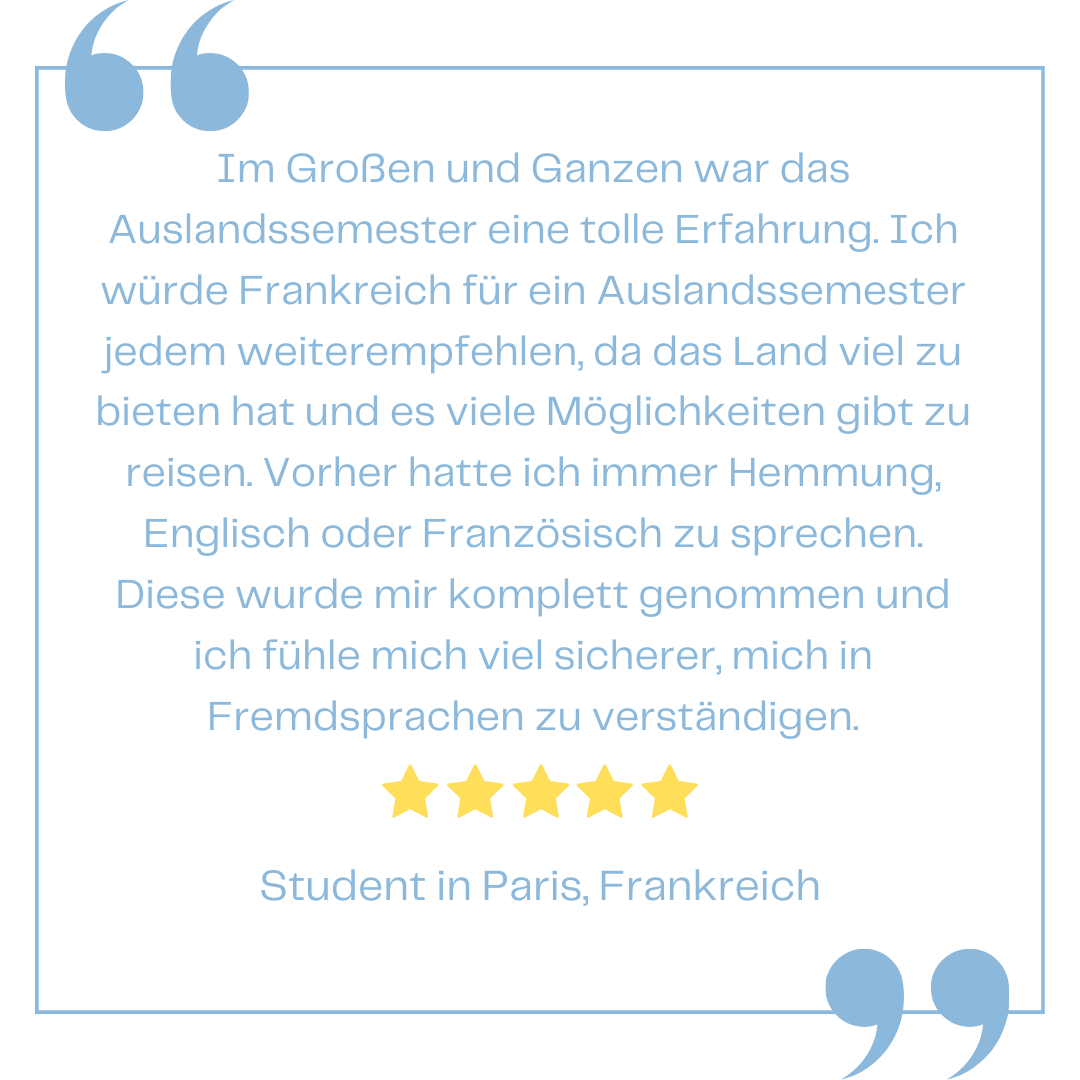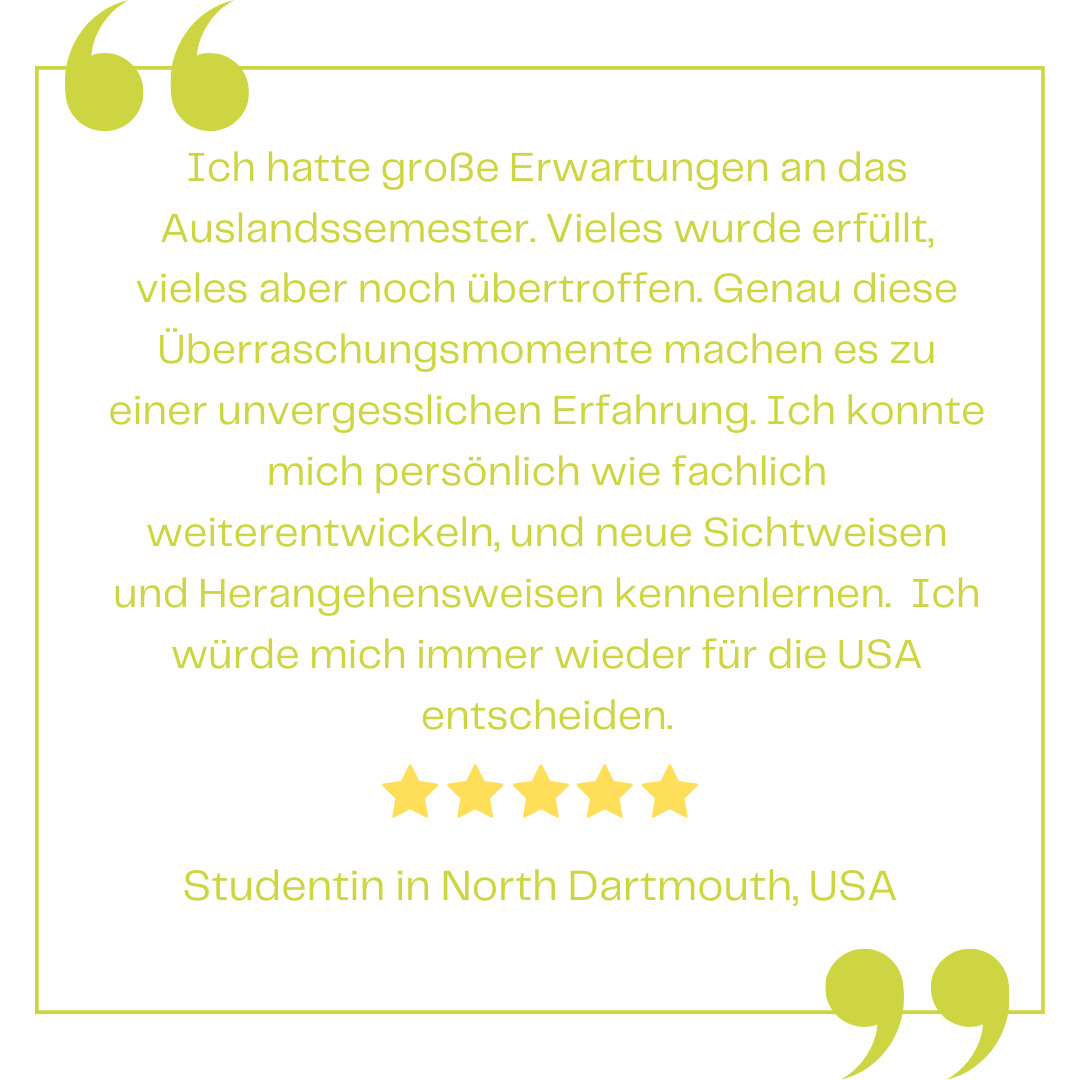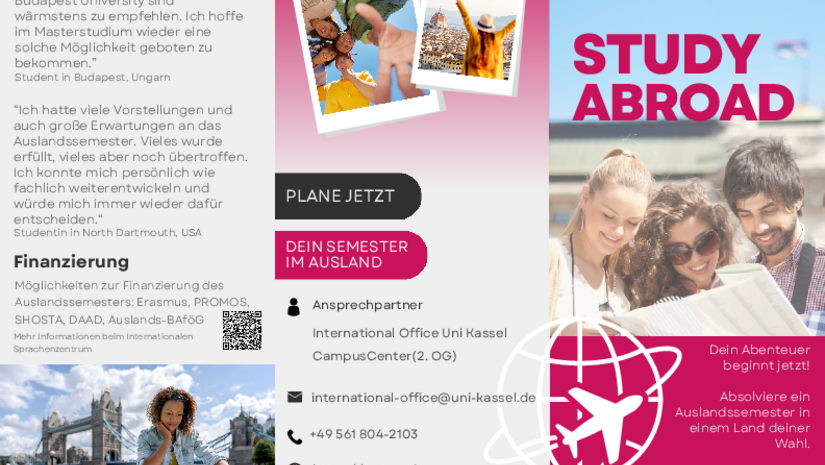Semester abroad
This page contains automatically translated content.
You want to go abroad?
A semester abroad is more than just relocating the lecture hall. It's a chance to expand your knowledge in a global environment and experience a variety of cultures. Develop intercultural skills, make lifelong friends and open the doors to exciting career opportunities.
Why go abroad?
A semester abroad promotes your personal development in many ways. You become more independent, more self-confident and learn to master challenges.
During your semester abroad, you will make contacts with people from different parts of the world. These international connections can prove extremely valuable later on, whether professionally or personally. Of course, you will improve your language skills when you study in a country where a different language is spoken. A semester abroad gives you the opportunity to explore new places and experience adventures. Use your free time to explore the surroundings, travel to new countries and make unforgettable memories.
In addition, each university has its own teaching approach and focus. By spending a semester abroad, you can benefit from different teaching methods and subject areas. This expands your knowledge and skills.
In summary, a semester abroad is a valuable opportunity to grow both personally and academically. It broadens your horizons, strengthens your skills and enriches your life in many ways.
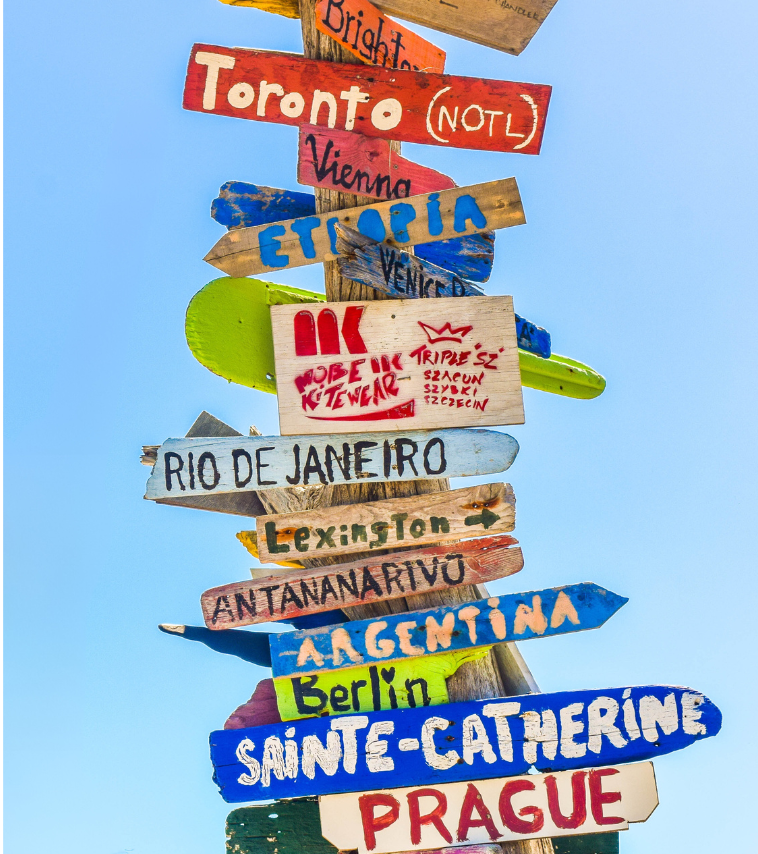
Questions about the semester abroad
If you can imagine spending a semester abroad, you should find out about your options as early as possible. A year in advance is often a good amount of time to start preparing. However, we recommend at least 6 months in advance to guarantee a smooth process.
You can complete your stay abroad in two different ways:
You can go to a partner university or you can organize your trip yourself as a freemover.
What are the differences between the two options?
Partner universities:
- There is a clear database of partner universities. This simplifies your research immensely.
- The application process is often regulated and therefore simple.
- Your semester abroad can be financially supported, e.g. via the ERASMUS program.
- Recognition of acquired credits is usually possible without any problems.
Freemover:
- You can potentially study at any university. If your university of choice accepts you, you can also study in exotic countries outside of Europe.
- Although the application process involves more organizational effort, you have more freedom in your decisions.
- In the past, 'freemover semesters abroad' have resulted in established collaborations. Your stay can therefore lay the foundations for future university partnerships.
Faculty 15 offers students the opportunity to spend time abroad at various partner universities in Europe and the USA as part of their studies. The ERASMUS program of the European Union provides financial support.
We offer ERASMUS cooperation opportunities for a semester abroad at the following universities:
- Jaume I University in Castellon, Spain: https: //www.uji.es
- University of Coimbra, Portugal: https: //www.uc.pt
- University of Padova, Italy: https: //www.unipd.it
- Mälardalen University of Applied Sciences, Sweden: https: //www.mdu.se
- Riga University of Technology, Latvia: https: //www.rtu.lv
- Lappeenranta-Lahti University of Technology, Finland: https: //www.lut.fi
- Gdansk University of Technology, Poland: https: //www.pg.gda.pl
- Bydgoszcz University of Technology, Poland: https: //www.utp.edu.pl
- Istanbul University of Technology, Turkey: https: //www.itu.edu.tr
- Ondokuz Mayis University, Turkey: https: //www.omu.edu.tr
- FH Campus Wien, Austria: https: //www.fh-campuswien.ac.at
- University of Naples Federico II, Italy: https: //www.unina.it
- École nationale supérieure d'Arts et Métiers, France: https: //www.ensam.eu
You can find a list of all cooperating universities here.
For students who want to go abroad with an ERASMUS+ scholarship, for example, there is no uniform application deadline for all Faculties/fields. Please enquire about the relevant deadlines and other formalities with the responsible cooperation officers.
If you do not require funding or are a freemover, you can also organize your semester abroad more spontaneously.
Your ERASMUS grant will be paid to you in two installments: 70% before the start of your trip abroad and 30% afterwards.
Your monthly funding installment can be found in the following table:
| Groups | Countries | Monthly funding rate |
| 1 | Belgium, Denmark, Finland, France, Germany France, Ireland, Iceland, Italy, Lichtenstein, Luxembourg, Netherlands, Norway, Austria, Sweden | 600€ |
| 2 | Estonia, Greece, Latvia, Malta, Portugal, Slovakia, Slovenia, Spain, Czech Republic, Cyprus | 540€ |
| 3 | Bulgaria, Croatia, Lithuania, North Macedonia, Poland, Romania, Serbia, Turkey, Hungary | 540€ |
The following additional funding is also available for participants with fewer opportunities:
| Additional funding | Students with disabilities, Additional needs due to chronic illness, Students with children, first-time graduates (students from a non-academic family) parents), employed students | +250€/month |
During your stay at the university abroad you do not pay tuition fees.
In principle, the examination board is responsible for the recognition of credits earned abroad. The examination board asks the department's specialization and module coordinators to assess whether the credits earned abroad are equivalent to the requirements of our university.
Before you go abroad, you should therefore consider and research which courses you would like to take. You should then have your provisional examination plan ('Learning Agreement') approved by your specialization and module coordinator.
After your semester abroad, ask your specialization coordinator to confirm that you have passed your exams and have them entered by the Examinations Office.
The ERASMUS officer Fatih Meral is responsible for all issues relating to ERASMUS funding.
You can find out how to apply for ERASMUS funding, who your contacts are and what deadlines need to be met here.
For general questions you can contact the International Office, questions about the ERASMUS program or existing cooperation agreements can be answered by our ERASMUS representative Fatih Meral(f.meral[at]uni-kassel[dot]de).

Questions about the internship abroad
You should plan your internship abroad at least 4 months in advance, preferably even earlier. Although the application deadline for Erasmus funding is 2 months, the funds are often exhausted at short notice.
In addition, an internship requires careful planning to ensure that it suits you perfectly. Especially if you want to complete the internship with a company, you need to allow enough time for the often lengthy application process.
Faculty 15 offers ERASMUS cooperation opportunities for an internship abroad, BPS or final theses with the following partners:
- Purdue (USA), with Professor Riley Barta in the field of Energy Engineering:
https://www.purdue.edu - NTNU (Norway), with Professor Hafner in the field of energy technology:
https://www.ntnu.edu - Castellon (Spain), with Professor Rodrigo Llopis Doménech in the field of energy engineering:
https://www.uji.es
For your internship abroad, you do not have to rely on these existing collaborations, but can also look for your own partners. You don't have to limit yourself to universities or research institutes. Larger companies in particular offer numerous attractive opportunities for internships abroad.
Here you will find a list of helpful contacts, tips and search engines for finding your internship.
You can apply to the following programs to finance your internship abroad:
Internal university funding and grants:
- Erasmus+ funding program: Internship
https://www.uni-kassel.de/uni/studium/im-studium/studium-und-praktikum-im-ausland/finanzierung-/stipendium/auslandspraktikum-mit-erasmus - PROMOS: Study & internship, worldwide, from 4 weeks
https://www.uni-kassel.de/uni/studium/im-studium/studium-und-praktikum-im-ausland/finanzierung-/stipendium/promos-stipendium - SHOSTA: Study & internship, worldwide, from 4 weeks
https://www.uni-kassel.de/uni/studium/im-studium/studium-und-praktikum-im-ausland/finanzierung-/stipendium/shosta-stipendium
External university funding and grants:
- DAAD: Study & internship, worldwide
https://www.daad.de/de - BAföG abroad: Study & internship, worldwide
https://www.bafög.de/bafoeg/de/das-bafoeg-alle-infos-auf-einen-blick/einzelfragen-der-foerderung/gibt-es-bafoeg-auch-im-ausland/gibt-es-bafoeg-auch-im-ausland.html
Remuneration from companies:
Many companies also pay you a salary for your work and sometimes support you in finding accommodation.
Your ERASMUS funding for an internship abroad will be paid to you in two installments: 80% before the start of your trip abroad and 20% afterwards.
Your monthly funding installment can be found in the following table:
| Country groups | per day | per month (=30 days) |
Country group 1: Denmark, Finland, Ireland, Iceland, Liechtenstein, Luxembourg, Norway, Sweden | 25,00€ | 750€ |
Country group 2: Belgium, France, Greece, Italy, Malta, Netherlands, Austria, Portugal, Spain, Cyprus | 23,00€ | 690€ |
Country group 3: Bulgaria, Estonia, Croatia, Latvia, Lithuania, Poland, Romania, Serbia, Slovakia, Slovenia, North Macedonia, Czech Republic, Turkey, Hungary | 21,33€ | 640€ |
The following additional funding is also available for participants with fewer opportunities:
| Additional funding | Students with disabilities, Additional needs due to chronic illness, Students with children, first-time academics (students from a non-academic family) parents), employed students | +250€/month |
The ERASMUS officer Fatih Meral is responsible for all issues relating to ERASMUS funding.
You can find out how to apply for ERASMUS funding, who your contacts are and what deadlines need to be met here.
The amount of funding for PROMOS scholarships is based on the assessment of your application by a committee. This assessment is based on the following key points:
Individual scholarships:
A maximum of 100 points can be achieved.
- Evaluation of the letter of motivation according to the 4-eyes principle (max. 45 points)
- Academic achievements (max. 45 points)
- Social commitment (max. 10 points)
Funding categories are determined annually at the selection meeting depending on the funds raised and the number of applications. The classification into categories is based on the points achieved and determines the level of funding. Depending on the category, travel and/or accommodation costs are covered on a pro rata basis. Please note that the scholarship is paid out in one installment.
Here is an example of an internship abroad in the USA (West):
| Destination country | Partial scholarship installment | One-time mobility rate | Stay allowance per day | Tuition fees |
USA (West) | 450€ | 1.375€ | 45€ | 9.000€ |
You can use an internship abroad to have it credited as practical work experience(BPS) or to write your thesis in a company abroad.
Claudia Schneider is responsible for the recognition of your BPS. She will check whether the formal requirements for a BPS have been met before you start your trip. So get in touch with her early on.
If you would like to write your Bachelor's or Master's thesis abroad - either at a company or at a partner university - a professorship at the University of Kassel will take care of the supervision. Sometimes the theses advertised by companies do not correspond to the level of a Bachelor's or Master's thesis at our university and can therefore not be recognized. To avoid this, you should contact a potential supervisor in Kassel at an early stage and have the company's topic approved.
For general questions you can contact the International Office, questions about the ERASMUS program or existing cooperation agreements can be answered by our ERASMUS representative Fatih Meral(f.meral[at]uni-kassel[dot]de).
You can discuss all aspects relating to work placement studies (BPS/internship abroad) with Claudia Schneider.
